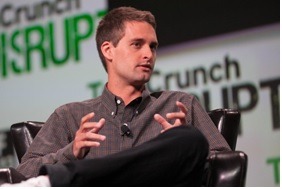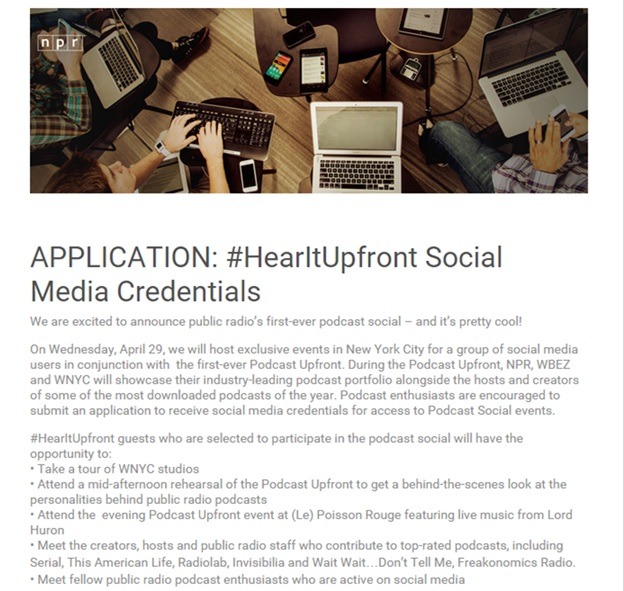On a recent trip, I was asked by a client why this blog seems to feature a public radio post seemingly every week. And my answer is that there are some pretty innovative things happening in the programming/content arena with their stations, as well as with networks like NPR, PRI, and APM.
But today’s post has to do with a highly visible public radio sales/marketing effort. Now if that sounds like something you might not associate with stations that carry “Fresh Air” and “A Prairie Home Companion,” think again. As we have covered in this blog, networks and shows in the public radio space have been especially successful with podcasts. By now, everyone’s heard of Serial, but the list of heavily downloaded public radio podcasts has become a long one.
And today, something groundbreaking is happening in the world of public radio. They’re holding a “Podcast Upfront” in New York City to showcase their on-demand programming. It’s a unique partnership between NPR, WNYC, and WBEZ – the sources of some of the most prominent podcasts. (Below is an application for social networkers eager to cover the event.)
If you’re not familiar, an “upfront” is a network/cable television event where programs and shows are unveiled to advertisers – often featuring celebrities and stars – in order to lock down commercial commitments and to generate a lot of upfront income. Hence the name. It’s way off locking in dollars, showcasing great content, building anticipation, and generating buzz in the ad community.
For the first season of Serial, MailChimp was the smart brand that got in on the ground floor of this award winning podcast. It will be fascinating to see how this consortium of public radio content creators can attract different brands, more underwriting, and social media influencers to support its podcasting efforts. They’re using the hashtag #HearItUpfront to spread the news socially, and that might be worth watching today.
Notably, iHeartMedia staged its “SoundFront” event last week – its version of the upfront that announced a dozen new podcasts that include The Vent with actor Jaime Pressly, Heart of the Beat with Jared Leto, and a reality-radio podcast called Get Mic’d that will troll the world for the “next great iHeartMediaDJ.” (Sounds better than running ads in the trades.)
 Unlike the public radio podcasts, these iHeartMedia on-demand features haven’t launched yet, but the company is using the power of the upfront – along with business celebrities Bob Pittman and Snapchat CEO Evan Spiegel (pictured left) – to attract attention to radio.
Unlike the public radio podcasts, these iHeartMedia on-demand features haven’t launched yet, but the company is using the power of the upfront – along with business celebrities Bob Pittman and Snapchat CEO Evan Spiegel (pictured left) – to attract attention to radio.
That begs the question of why radio hasn’t attempted to stage upfronts for other programming – particularly on the local level.
We have often talked about why All-Christmas Music stations don’t effectively cash in on their annual efforts when those holly, jolly playlists featuring Burl Ives, Brenda Lee, and the Singing Dogs consistently double and even triple their average ratings performance.
Or stations that present annual concert series. Why wouldn’t an upfront work in order to attract advertisers and marketers to invest – in advance – in these programs?
Or stations that carry play-by-play sports who want to lock down big dollars before the first ball is thrown or field goal is kicked. An upfront event featuring the play-by-play team, celebrity jocks, and other station celebs is a small price to pay for bringing in early believers at solid rates.
Great brands have a solid track record of success for sustaining events and great programs. Putting together a local upfront, featuring station and music celebrities is just smart marketing. It comes down to thinking big, and perhaps spending some money on event, complete with catering and the works in order to remind advertisers that radio is, in fact, a media player.
It’s also a reminder that we all need to be sold, whether we’re buying a house, a car, a smartwatch, or radio advertising. We want to feel good about the purchases we’re about to make and the people we’re doing business with. An upfront is a way to connect to the shows, stars, and brands that can help market our businesses.
Television has its own set of challenges, but it has always thought bigger than radio. The upfront concept is a great example of that. With CEOs like Bob Pittman and NPR’s Jarl Mohn who come out of the TV side of the media business now running radio megabrands, more aggressive sales and marketing efforts are a given.
And in a way, it’s no surprise that iHeartMedia and NPR are first to the podcast party. At our first DASH Conference in 2013, a session featured Brian Lakamp and Sarah Lumbard from iHeartRadio and NPR respectively, talking about the hard work, vision, and tenacity it required to get their icons on dashboards on numerous auto brands.
Two years later, both brands are back, creating their own impressive events, while breaking new ground.
You may say that their heft, national footprints, and influence are what enables both iHeartMedia and NPR to pull off these upfront spectacualrs. But on the local level, strong radio clusters with great programming, features, and events have hometown yank, too. It’s time to reassess sales strategies in order to provide advertisers with the chance to share in their success, whether it’s a national network or a great station in Tulsa, Tallahassee, or Toledo.
It’s Marketing 101.
- What To Do If Your Radio Station Goes Through A Midlife Crisis - April 25, 2025
- A 2020 Lesson?It Could All Be Gone In A Flash - April 24, 2025
- How AI Can Give Radio Personalities More…PERSONALITY - April 23, 2025






Buyers populate tV upfronts because they hope to lock in low rates for ads in shows where future demand will push prices up. Radio has few if any shows or stations where that kind of price pressure exists – so a big upfront event could prove embarrassing. Sadly, the biggest news in radio right now is that classic rock is on the upswing because a new generation is discovering it. this isn’t because radio is marketing it to them or changing the way it presents it, but because the power of the music is so strong that millennials/Gen Y are discovering it on their own. That says more about Zeppelin, Floyd, Aerosmith and van Halen than about radio.
Radio has nothing that approximates the excitement of a new TV show – maybe it should address that problem before throwing an upfront party.
“Hey – we’re throwing an upfront party for our new brand – if features different gold based configurations with canned liners and voicetracked talent on mostly signal challenged FMs that will generate lousy ratings and 35+ demos…get in now before the groundswell of demand crowds you out!!”
In the build it and they will come scenario, you have to build it first.
I appreciate that content dilemma, Bob, and a local upfront would not be for everyone. But there are some great stations that present fabulous events and have strong assets that may be missing the boat. I’m looking forward to more comments that discuss this issue of whether there’s worthy content on the radio.